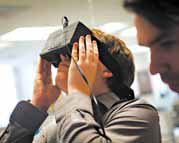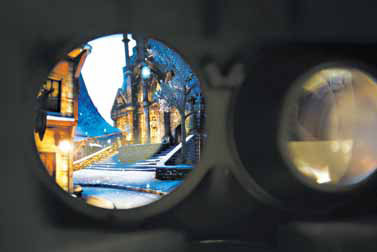When fantasy becomes reality
Updated: 2013-03-17 08:37
By Nick Wingfield(The New York Times)
|
|||||||
|
A view from inside a headset by Oculus VR, which may sell for about $300, provides a 110-degree field of view versus the 40 degrees offered by many headsets. Palmer Luckey, 20, below, is the company founder. Photographs by Patrick T. Fallon for The New York Times |

IRVINE, California - Virtual reality is one of many inventions that never seemed to make the leap from science fiction to mass-market product - held back by high prices, ungainly designs and crude graphics.
But now the bonanza of cheap, high-quality components created for the mobile electronics market, coupled with some technology innovations by a Southern California start-up called Oculus VR, could bring within reach the fantasy of many a video gamer: a virtual reality headset that costs just a few hundred dollars and puts players inside games like no television set can.
Resembling an intimidating pair of ski goggles, the Oculus Rift, as the headset is called, envelopes the vision of people who wear it in vivid, three-dimensional images. A snap of the head to the left instantly shifts the perspective inside the game in the same direction. The Rift offers a 110-degree field of view, far more expansive than the 40 degrees of many virtual reality headsets.
"The next big thing isn't always a brand-new technology that you never heard of," said Cliff Bleszinski, a former game designer at Epic Games. "It's this thing that existed 10 years ago and quietly got better."
Despite its missteps in the consumer market, virtual reality has become commonplace for a number of industrial and military applications, where the high cost of headsets - from $1,000 to $50,000 - has been less of an impediment. Many of the crucial parts in the Oculus Rift are the same components found inside smartphones and tablets, including the headset's 17-centimeter display and its sensors for detecting head movements. Because those parts are already being produced in enormous volumes in factories in China, Oculus can create a product that is likely to cost consumers between $200 and $300.
"I've said this before, so you can't totally trust me on this, but really, really I believe this is the time," said Mark Bolas, an associate professor at the University of Southern California and an adviser to Oculus VR.
Oculus used the crowdfunding site Kickstarter to harness the enthusiasm of virtual reality fans and to take orders so it would not produce too many headsets. It raised $2.4 million on Kickstarter and received orders for 10,000 headsets. The first ones are primarily aimed at game developers. Oculus has not said when it will ship a version for consumers.
If the company is successful, it will have a lot to do with Palmer Luckey, the 20-year-old founder, who seems to have wandered out of a casting call for unconventional, young technology entrepreneurs. He walks around his office in bare feet and sits on the floor for a meeting.
Mr. Luckey was a home-schooled teenager living with his parents in Long Beach, California, when he began collecting virtual reality headsets and tinkering with designs.
Last summer, he paid a visit to Mr. Bolas at U.S.C., who hired him immediately to help out with virtual reality projects at the university's mixed reality lab, a research group financed largely by the United States Defense Department.
"If there had been a perfect headset, I wouldn't have gotten into virtual reality," Mr. Luckey said.
There are still big obstacles for Oculus VR. The company has not announced commitments from game developers to create complete games. The headset, too, is currently designed to work with computer games, not with the popular consoles.
Virtual reality headsets can also cause motion sickness, something Oculus is working to fix.
Jaron Lanier, a virtual reality pioneer in the 1980s, said he was rooting for Oculus to succeed. "It's what I was doing when I was that age," he said of the company's efforts. "I think it's lovely. I don't know if this will be the one that hits or not."
The New York Times
(China Daily 03/17/2013 page11)
